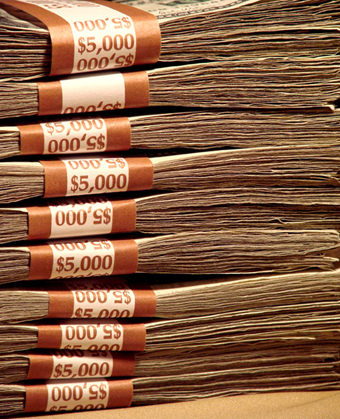
Warren Buffett, Shooting Tuna
By Earl H. Perkins | published Friday, January 10, 2014 |
Thursday ReviewAssociate Editor
That Al Lewis over at the Wall Street Journal always cracks me up. Almost every Sunday he writes a gem that is insightful and funny.
He's like that special teacher you had in school who taught you great stuff, even if you weren't that enthusiastic about the subject matter.
One recent column skewered the Oracle of Omaha—Warren Buffett. The rugged American business magnate is considered the most successful investor of the 20th century and known widely as a big-time philanthropist. But Rolling Stone's Matt Taibbi must not have read Buffett’s public relations releases.
"The world's most powerful investment bank is a great vampire squid wrapped around the face of humanity, relentlessly jamming its blood funnel into anything that smells like money," he said.
Taibbi would be referring to Berkshire Hathaway, an investment corporation which Buffett heads as CEO and is also its largest shareholder.
Lewis observes that Buffett is possibly the nicest billionaire you could ever meet, and one of the world's most influential people. He was considered the world's wealthiest person in 2008, and the third wealthiest in 2011.
He helped President Barack Obama by complaining that rich people don't pay enough taxes. Then the always understated owner of Dairy Queen noted that derivatives are weapons of mass destruction, and capitalism without failure is like Christianity without hell. What the heck?
Now Goldman CEO Lloyd Blankfein has recently announced an agreement making Berkshire Hathaway one of Goldman's top 10 owners. Buffett invested $5 billion into Goldman in 2008, in the feverish and darkest moments of Wall Street crisis and right before the investment bank began receiving billions in rescue funds from the federal government and the Federal Reserve. How cozy.
Former Goldman CEO Henry Paulson was treasury secretary in 2008 when he advocated a $700 million bailout fund, opining that the financial system would collapse without the direct injections of green. If that didn't get the attention of all those backwoods folks, he threw in that in the event of a total collapse, martial law might be imposed and automated teller machines wouldn't work.
American International Group (AIG) was the largest beneficiary of said bailout ($182 billion) because it had backed and insured—among other things—hundreds of thousands of imploding securities (many known by the infamous moniker, the “default swap”), resulting in a $12.9 billion payout to Goldman.
Buffett benefited greatly from this massive influx of cash because regulators allowed Goldman to morph from investment bank to commercial bank, giving it nearly zero-interest loans from the Federal Reserve. In all fairness to the other blood-sucking squids, Wells Fargo, Bank of America, US Bank and M&T Bank also benefited from the largesse.
He was able to honestly state that he never needed a government bailout, although his fingerprints were all over every facet of the debacle. He played it as though he were Niccolo Paganini handling a Stradivarius violin.
"We will never become dependent on the kindness of strangers," Buffett stated to shareholders in 2009. "Too-big-to-fail isn't a fallback position at Berkshire.…when the financial system went into cardiac arrest in September 2008, Berkshire was a supplier of liquidity and capital to the system, not a supplicant."
Still, Berkshire successfully fed off the carnage and recklessness of hundreds of bankers, while Buffett derided the idiocy of taxpayers bailing them out.
"I like to shoot fish in a barrel," Buffett says. "But I like to do it after the water has run out."
Related Thursday Review articles on this topic:
A Brief History of Debt (review of Debtor’s Prison: The Politics of Austerity Versus Possibility; author, Robert Kuttner; review by R. Alan Clanton).
Congress at Work, Or Not (review of Act of Congress: How America’s Essential Institution Works, and How it Doesn’t; author, Robert G. Kaiser; review by R. Alan Clanton).
